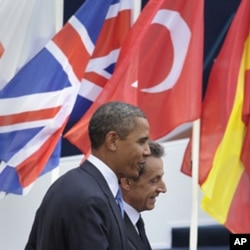The president of France, Nicolas Sarkozy, had planned to use his leadership of the G20 this year to highlight some of the needs of the developing world. Instead, the focus of G20 summit in Cannes has been on the threat of a Greek default and destabilization of the eurozone.
Europe’s financial crisis affects more than the 27 members of the European Union.
“There is a direct relationship between the crisis in Europe and flows of resources to Africa and development efforts around the world,” says Sam Worthington of InterAction, the largest U.S. coalition of non-profit organizations devoted to debt relief and development.
“Europe is one of the biggest centers of remittances around the world,” he explained. “As Europe gets poorer, those remittances begin to dry up. European banks have a large presence in Africa, bank credits will also continue to dry up. And as European countries begin to try to deal with their own fiscal crises, one of the first areas where we fear we will see cuts is in official development assistance.”
Famine and food prices
It’s ironic, Worthington said, that the debt crisis in the eurozone comes at the same time as the first famine of the 21st century in the Horn of Africa, with 13 million people being food insecure and another 750,000 people at risk of starvation. Contributing to the situation is the growing volatility of food prices, an issue that is also to be considered by G20 leaders.
“The solutions being offered here in Cannes,” said Worthington, “are important but not sufficient. One of the big proposals being debated in the communiqué right now are issues of food stocks in West Africa. At this point in time, it looks likely that some form of food reserves will be put in place but only for humanitarian uses in Africa. The broader question of regulation of food prices and the deeper fulfillment of the commitment made by the G8 at L’Aquila for f 22 billion dollars [in development aid] still remains elusive.”
Strengthening the safey net
Another goal of the G20 is to find new ways to improve the social safety nets of developing countries and support for development, education and climate mitigation. One proposal, back by Microsoft entrepreneur Bill Gates, calls for a tax on international financial transactions.
Some countries, including the United States, Britain, Japan and Brazil, oppose the tax.
“The UK will clearly not be on board,” said Worthington, “so it will come down to Germany, France and other euro countries, a process that will need to make it through to [European Union headquarters in] Brussels.
“It is unlikely France will act alone,” he continued. “We are seeing some support from South Africa and other groups. African countries have largely been silent in support for this tax, but if it is put in place it could generate up to 60 billion dollars in revenues.”
He said supporters of tax are using a two-part approach.
“The real question is what will be its uses?” he said. “Some in Germany say it should be used to offset deficits within European countries themselves. The battle for the tax itself is a big one. But the bigger battle is will this tax be used as a tool to finance some of the repayment effort s and financial efforts associated with Greece ?
The concern of NGOs, he said, is that the poor and development projects will not benefit in the long run.
“Our real cry here in Cannes,” said Worthington, “is that the problems the developed world is currently experiencing should not mean solutions are done on the backs of the world’s poor.”
He adds that with global interconnectedness, the answers to the sluggish world economy require inclusive solutions.
Inclusive growth means support for development efforts.
“The growth in Africa and in other parts of the world are now central to the well-being of people [everywhere],” he said.
“So there is now a direct economic relationship between development efforts in Africa, growth in African countries and the longer term global recovery,” said Worthington





